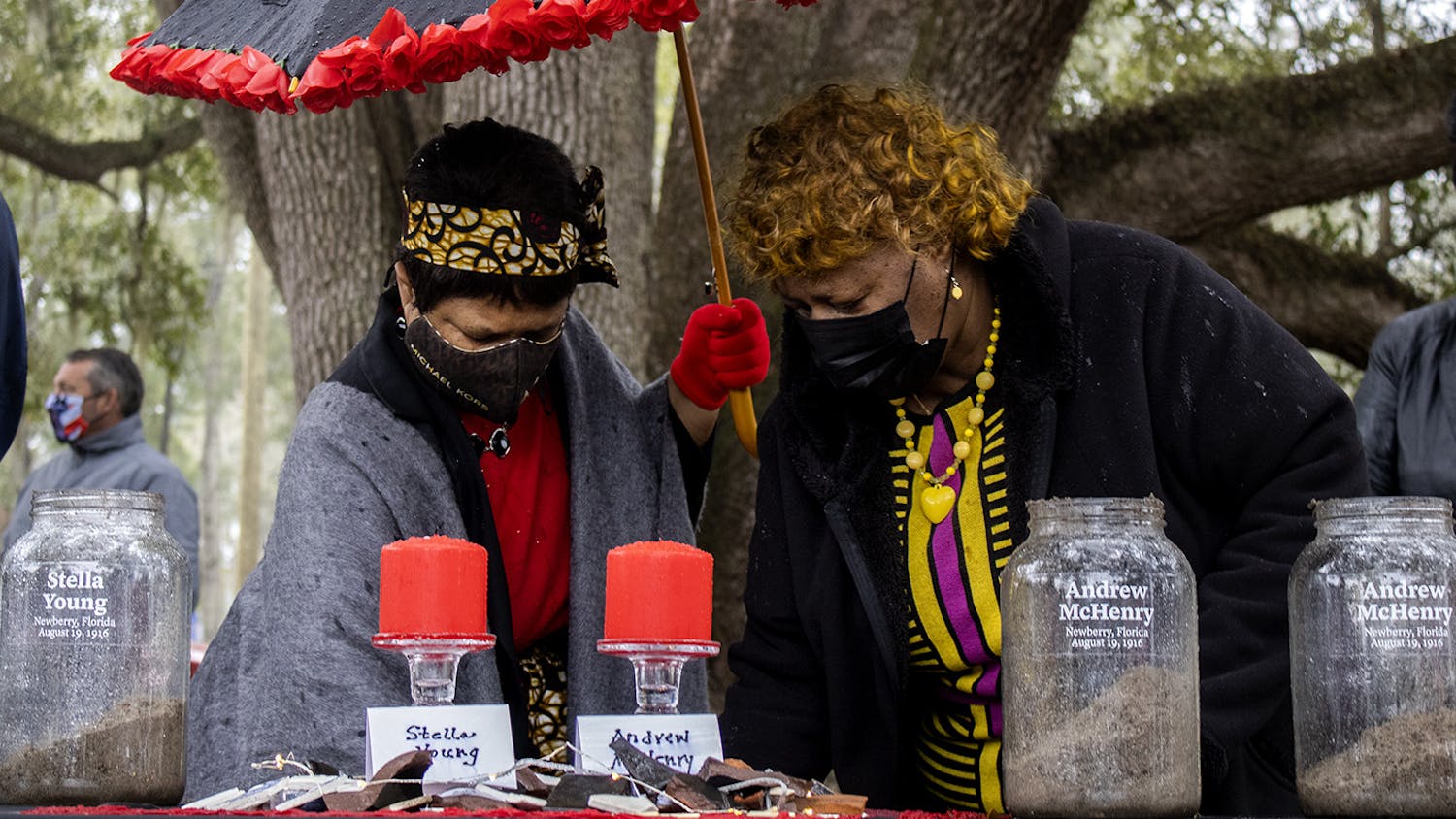Latoya Brazil didn’t know the story of how her great-grandfather Lester Watts was lynched in Gainesville until she was 17 years old. Brazil’s great-grandmother, who was with Watts when he was shot, sat Brazil and her cousin down and told them the story.
Seventy-nine years after Watts was killed, Brazil brought her family members from across the country together to honor Watts and other Gainesville victims.
“From that story, there was a burning inside of my cousin,” Brazil said. “That’s why we are here today to know the true story of what happened that night and what the comings were.”
On Saturday, bright smiles quickly turned to tears as people lined up to scoop soil into the clear jars marked with the names of Gainesville’s lynching victims.
About 100 community members, Gainesville residents and local officials gathered Saturday for a soil collection ceremony planned by the Gainesville Subcommittee of the Alachua County Community Remembrance Project (ACCRP) and the Equal Justice Initiative (EJI) at the Alachua County Administration Building.
The EJI’s Community Soil Collection Project gathers soil at lynching sites in ceremonies throughout the country to display in exhibits that bear victims’ names at The Legacy Museum in Montgomery, Alabama. Community organizers along with former County Commissioner Robert Hutchinson traveled across the city to the known lynching sites to collect the soil.
Newberry, whose victims are widely recognized as the Newberry Six, held a similar ceremony earlier this month. Saturday’s ceremony is the first event of its kind to be held in Gainesville.
Little is known about most of the Gainesville lynchings, but historians are aware of at least 50 Alachua County victims.
Lynchings, along with other accounts of white supremacy, are often poorly documented, according to a New York Times report. More accounts of lynchings recently became public, such as the 2017 county report that uncovered more than 21 new victims.
Two jars of soil dedicated to each of the known Gainesville lynching victims killed between 1868 and 1942, sat on tables in front of the lectern next to bright red roses placed beside them.
Guests poured soil into the jars after a slate of speakers including pastors, local officials and community organizers delivered speeches, sang songs and recited poems. One set of jars was dedicated to victims whose stories remain undiscovered. Of the two jars per victim, one jar will be on display in The Legacy Museum and the other will stay in the county.
Guests occasionally bowed their heads in prayer, some closing their eyes to reflect on the county’s history.
At the lectern, Assistant County Manager Carl Smart recounted all of the known details about city victims in a captivating tone. He expressed anger about the lack of accountability for the crimes of lynching mobs throughout the city’s history.
Smart said collecting soil has a significance beyond face value.
“The soil is symbolic of the blood crying out from the grounds,” he said. “While collecting soil from the site of a lynching is a simple gesture, it’s an important act of remembrance beginning a process of healing and uniting us to move forward.”
Attendees sat in chairs or stood quietly and nodded solemnly. Some were dressed in Black Lives Matter shirts, holding pamphlets that read “Stop Police Killings!”
Cynthia Curry, a 65-year-old Gainesville resident, said she came to the ceremony partly because she knew the family of Dr. Patricia Hilliard-Nunn, a UF professor who initiated lynching research in the county.
As a Black person, Curry said it’s important to engage with the county’s past. She thought the ceremony was a beautiful tribute to the victims.
“It’s a matter of history,” she said. “It’s to hopefully recognize the sins of our past and reconcile them going forward.”
Speakers took to the lectern for creative, lively performances throughout the ceremony.
Gainesville resident Marvin Winston Jr. performed an original spoken word poem called “Ancestors.” He delivered the poem with flow and style, pausing for emphasis to engage listeners as their spirits were lifted.
“I know I’m dreaming but can you picture what I’m seeing?” Winston Jr. recited. “An ancestor chained to me saying: ‘Be ready. Go ahead and spit, we got the beat ready.’ And he’s saying to me: ‘Youngin, here’s your chance.’”
Nii Sowa-La and Ayoka Sowa-La performed a libation ceremony, a traditional African ritual, where Nii poured water on the ground as a tribute to fallen ancestors.
Emma Ronchetti, an 18-year-old UF public relations junior, stood in line to pour soil to honor the victims. Ronchetti said the ceremony was somber, emotional and important, but wonders why it’s taken so long for Gainesville to officially recognize its past.
“It’s crazy that it’s 2021 and that we’re just now learning about this,” Ronchetti said.
Four community pastors led the crowd in prayer, speaking to themes of unity, oneness and divine love. The Rev. Gerald Duncan, a pastor at Prayers By Faith Ministries, said there’s more that unites us than divides us as humans.
“Our precious creator, thank you for removing the scale from our eyes and exposing the scars and the wounds of despair that accompany many through life,” Duncan said. “Give us the courage and will to change the system.”
Bre Lamkin, a 36-year-old EJI project manager, visited Gainesville from Montgomery to attend the ceremony. Lamkin said the fight for racial justice persists today through advocating against the death penalty and police brutality.
After traveling around the U.S. for similar ceremonies, she said she was excited to see the Watts family come together and honor their relative.
“We have to do something about this,” she said. “And it starts with people like you, gathering here on a Saturday morning to memorialize these victims.”
Contact Alan Halaly and Emil Munksgaard Grosen at ahalaly@alligator.org and emgrosen@alligator.org. Follow them on Twitter @AlanHalaly and @EmilMunkGrosen.

Alan Halaly is a third-year journalism major and the Spring 2023 Editor-in-Chief of The Alligator. He's previously served as Engagement Managing Editor, Metro Editor and Photo Editor. Alan has also held internships with the Miami New Times and The Daily Beast, and spent his first two semesters in college on The Alligator’s Metro desk covering city and county affairs.

Emil Munksgaard Grosen is a news assistant for The Alligator and a sophomore who plans to double major in political science and public relations. Interested in civil rights and political communication, he dreams of becoming a lawyer and humanitarian.





